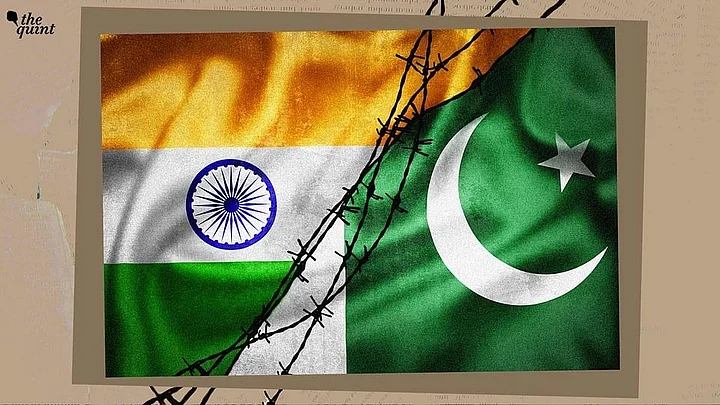In Lahore, the residence of an Army commander was burnt down. In Rawalpindi, the Army’s headquarters were attacked. What a sight it was seeing those angry civilians storm military institutions.
And more surprisingly, was that all it took?
An angry mob, incensed at seeing their beloved leader being arrested? More than 75 years later, were the people of Pakistan finally freeing themselves from a system of oppression and fighting back against suppression? Is this how easy it was to destabilise a system that no matter how broken, somehow worked on a daily basis?
And was this to be the end of the country as India had known it? Goodbye, and good riddance Pakistan. No more 'enemy' state to keep you up at night?
Not quite. India has plenty to be worried about. What we are facing now is nothing new and although the country is likely to survive, the changes that have taken place are alarming and should worry India.
Pakistan’s India Outlook
Pakistan has had a turbulent history since the Partition and the waves of instability and uncertainty don’t show any sign of abetting. Yet the people of Pakistan have carried on living and creating an identity, celebrating milestones on the international stage, fighting for survival, and somehow thriving in some cases. All of this has come with a heavy dose of diplomacy which has possibly been the most definitive factor in ensuring that Pakistan has maintained civil relations with the neighbouring countries, especially India.
For India to claim Pakistan is the enemy is one complete narrative; but for Pakistan to claim a constant threat in the form of India since the Partition, is only part of it. But in the midst of political personalities, military might, and cross-border aggressiveness, there is no denying that the people of Pakistan have consistently fought for creative space not just for themselves but also as a means of establishing peace with India.
While Wagah echoes with cheers and curious glances – we do look alike, don’t we? – and Siachen remains the world’s highest graveyard, it has been the people, the everyday folk, who have consistently maintained some semblance of civility as the country has lurched from one crisis to another. The usual clichés can apply – 'Pakistan on the brink’, ‘Pakistan at crossroads – to make sense of what the country is experiencing but the real survivors and heroes are the people.
Representational Bias Against Pakistanis
If India has a glimpse of Pakistan beyond a political lens – Bollywood of course, hasn’t had much of a glimpse let alone a bit of research – it has mostly been through people's interaction that has come in the form of the Arts.
Literary festivals, fashion shows, shopping trips, religious pilgrimages, historical trips, family visits, and partition-based stories all are possible because of the limited stability that the civilians have clutched onto, not necessarily only as a form of resilience but also as survival. It isn’t exactly a normal existence when you sit at a café where a security guard sits swatting flies with a gun. And there is something bizarre when you’ve grown up consuming the very beautiful Madhuri Dixit’s hit songs only to see yourself portrayed as an Adaab-ing, taveez-wearing, surma-adorning terrorist… thank God we have a good sense of humour to laugh it off otherwise we’d self implode. Which wouldn’t help the Indian entertainment industry much I suppose.
India has plenty to be concerned about. The crackdown on civilians is on those who wanted and believed in democracy, who wanted a progressive country. How that turned out internally is a different matter and the end of a dream is something that will take time to recover from.
The political power vacuum left by the dismantling of political parties including the Muttahida Qaumi Movement (MQM) and the Pakistan Tehreek-e-Insaf (PTI) is also alarming because it is yet another form of losing democratic space within which civilians could actually establish themselves and advocate for greater engagement with India and Kashmir.
Having been described as a military economy, it would actually be in India’s benefit to have a prosperous, democratically healthy neighbour so not only would your depiction of Pakistan be authentic but also the need to address a constant threat would decrease significantly.
Should India Brace Itself Further?
The thing is, a destabilised Pakistan for Pakistanis is nothing new – we know how to live and survive. But for India, it could mean a different era of relations based on increased hostility. Picture this – if the military has internal divisions, the best way to garner support is to rally the troops towards a threat which in this case, would be India.
Add to the mix the role of China and well, then that’s India on a losing wicket. With China being the champion in the Muslim world given its role in brokering a friendship between Saudi Arabia and Iran, and Israel brokering peace with Muslim countries, India risks being very much a pariah state on the global stage. And for what? What gains are to be made in such a situation?
Cheering on the demise of the PTI, laughing at the chaos, and chest-thumping at the power vacuum seem all dramatic and very much like an action film. But the reality is the country remains, while civil society may not. It’s who retains the power that should make India worry. Because when you cheer on instability in Pakistan, it’s not the powers that be that are affected it is the average person on the street. And without them having a voice, having a say means massive trouble for India.
(The author is a Pakistan-based contributor. This is an opinion piece. The views expressed above are the author’s own. The Quint neither endorses nor is responsible for them.)
